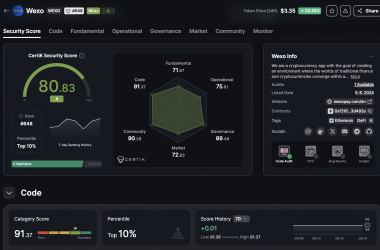This is how smart contracts can change the world
DAO DECENTRALIZATION PoS (Proof-of-Stake) SMART CONTRACT20-Jan-2022

Publicaciones principales

Wexo Points: Find places where you can pay with Bitcoin (App Up...
Search nearby businesses that accept Bitcoin payments
Leer másRevolutionary technology with the potential to positively change how the world works, or at least a wide range of industries. Check out with us some options and current examples of using smart contracts.
In the previous article on smart contracts, we looked at their nature and operation, and we also discussed the interesting blockchains that smart contracts support. You already know how a blockchain works, and that its opportunities extend beyond moving money.
Huge society-wide benefits
Blockchain and smart contract technology have enormous potential not only for individuals and organizations, but also for society as a whole. Thanks to the opportunities that smart contracts based on blockchain bring, our society can become more transparent, more efficient, and more democratic, non-corrupt, and non-manipulated…
And smart contracts will also contribute to a new level of security. Smart contracts are used in all industries. Here are some ideas and application opportunities:
ICO: Own cryptocurrency
One of the principles where you can find smart contracts is ICO (Initial Coin Offering), i.e. the creation of own and new cryptocurrencies, respectively tokens. The creator of the new cryptocurrency will withdraw funds from investors, for example, using Ethereum in some crowdfunding way, for example via an ERC-20 token running on Ethereum's network. But those interested in a new cryptocurrency must carefully consider project potential and credibility to avoid exchanging Ethereum for worthless tokens.
The long road to the ideal or utopia?
A key area that blockchain and smart contracts will change is clearly the public sector. Many considerations and discussions around the implementation of decentralized technologies - such as eGovernment - may sound utopian. The first decentralized states such as Liberland and Liberstadt are examples of the potential functioning of the new world.
State contributions and subsidies
The public sector is outdated. It suffers from immense bureaucracy and inefficiency. When assessing, verifying and distributing unemployment benefits or social benefits, smart contracts could significantly improve and speed up the process, and prevent abuse of the system.
Government and state
Thanks to smart contracts, a clumsy and corrupt state could operate more efficiently and transparently. Reduced bureaucracy and clearly defined rules of state operations through precisely defined conditions, and everything is ensured without any risk of manipulation. Can you imagine a perfectly programmed state thanks to smart contracts?
Faster and without an intermediary
Online music and art licenses
Creators of music and video artistic content are now paid a commission by various platforms that connect them with fans to view or listen to their work. In a blockchain world, the need for a go-between would be eliminated, and artists would be paid for licenses for their work with smart contracts. Several startups are already solving this problem (Mycelia, Ujo Music).
Insurance
Thanks to smart contracts and the combination of insurance data with real-world information (such as the weather), blockchain can give new meaning to the statement "trust but check". One of the projects dedicated to insurance is Etherisc for example. This is referred to as a decentralized insurance protocol for creating insurance products.
An alternative to the legal system
Lex Cryptographia - this is a set of rules that work on the basis of smart contracts and decentralized autonomous organizations. Imagine a world in which conflict resolution is taken over by an automated online world. Which includes rules that are enforceable through technological tools rather than legal state institutions.
Some startups already act as an alternative to the judicial system. Examples are platforms such as Legalese, Kleros and The Aragon Network. Do you think we'll see Lex Cryptographia algorithms eventually printing the law, the judges and courts as we know them today?
Large corporations keep up
Smart contracts are the basis of the decentralized world revolution. They also form the core of DeFi, i.e. decentralized financing, using the power of different protocols. The most popular include Compaund, Aave and Uniswap.
A number of corporations, as well as some governments and state organizations, are already testing or experimenting with smart contracts.
A nation-state pioneer is the Swedish government, which has tested a land register based on blockchain and smart contracts to prove land ownership. With the help of smart contracts, a trade settlement system called Finality was created, which is backed by the Dutch bank ING. By the way, it is also involved in the development of other blockchain initiatives.
Also worth mentioning is video game giant Ubisoft. In grandiose style it offered users ownership of rare, distinctive NFT tokens based on the popular gaming franchise Rabbids.
What will spin the world one day?
Already hundreds, if not thousands, of platforms, projects, and startups use blockchain and smart contracts. The potential of blockchain is clear today, and anyone who decides to study top projects is probably considering investing in one blockchain.
The problem, however, is the amount of "waste" on the blockchain, as well as scams and fraud attempts. Newly-created projects are on thin ice, and without proper analysis we definitely do not recommend investing in them.
After all, history also shows the example where people in the 1990s saw the Internet's potential - and their investments in dubious Internet companies created the dot-com bubble that burst in 2001. But what's certain is that revolutionary technologies and new applications or services based on blockchain and smart contracts are here to stay, even after the dust settles.


